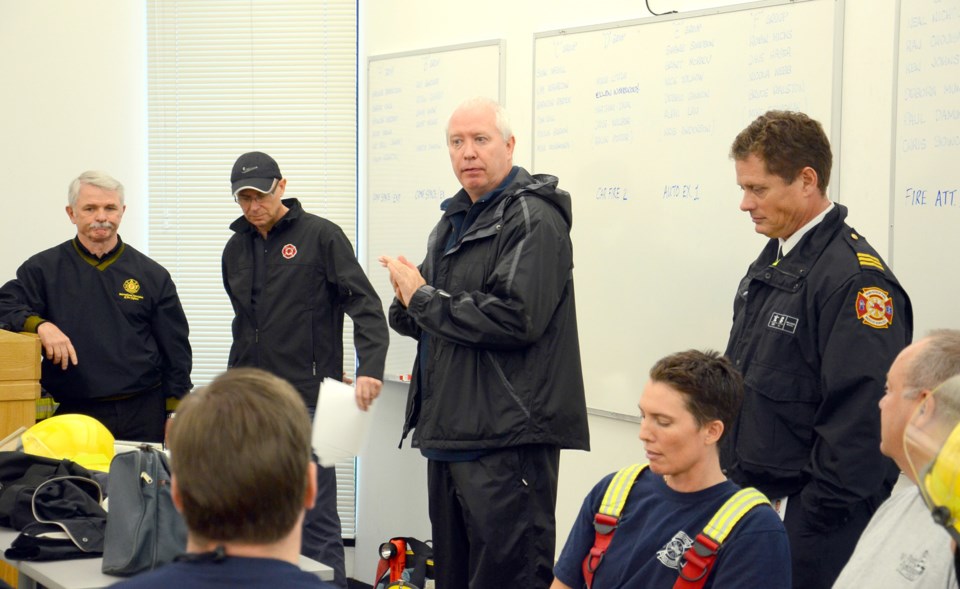Twenty years ago, if a firefighter was diagnosed with lymphoma and wanted workers’ compensation, he or she would have to prove exactly when and where they contracted the disease – a feat that was arduous, if not impossible.
That’s no longer the case, thanks to work by the B.C. Professional Firefighters Association and its parent organization, the International Association of Firefighters (IAFF).
Burnaby fire Capt. Mike Hurley is vice-president of the IAFF’s sixth district, which represents B.C., Alberta, Saskatchewan, the Yukon and the Northwest Territories. Before climbing the ranks of the firefighters’ union, he worked for IAFF Local 323 representing firefighters in Burnaby.
More than a decade ago, Hurley and other firefighters in B.C. were pushing the province to have specific cancers recognized as a job-related illness.
At the time, the onus was on firefighters to prove the cause of the cancer was, in fact, as a result of their work.
“You’re already going through a whole bunch of different issues, chemotherapy and all the stress that goes with actually having cancer, … (and) the last thing you needed was fighting Workers’ Compensation as well, at the same time,” Hurley said.
In 2002, Manitoba became the first province with presumptive legislation that assumes if a firefighter is diagnosed with one of the cancers recognized by the legislation, they receive automatic coverage. Alberta, Ontario, Nova Scotia and Saskatchewan quickly followed suit – spurring firefighters in B.C. to call on the provincial government to pass its own, similar legislation.
“It was 2005 when we had our first six cancers recognized. There was very strong scientific evidence that firefighters were getting these cancers at double the rate of the population,” Hurley said.
By 2007, three more cancers were added to B.C.’s presumptive legislation, bringing the total up to 10, including leukemia, lymphoma, brain, lung, esophageal, colorectal, kidney, bladder, ureter and testicular cancer.
“It certainly made a lot of difference in a lot of families’ lives; unfortunately a lot of people haven’t lived to tell their story, but the family, at least, gets some coverage when their loved one passes away,” Hurley said.
The fight, however, is not over.
According to the B.C. Professional Firefighters Association, firefighters are still nine per cent more likely to be diagnosed with cancer than the general public, and while one out of four members of the general public will die from cancer, for firefighters, the likelihood of dying from cancer is 14 per cent higher.
Right now, firefighters in B.C. are pushing to have four additional cancers – breast cancer, multiple myeloma, prostate cancer and skin cancer – recognized under the provincial legislation. If the province agrees, it would align B.C. with Alberta and Ontario, which have already updated their own legislation to include these four cancers.
“We’re working on them, and we’re hopeful that the government will move towards recognizing those shortly,” Hurley said. “We’re pushing hard.”
The fight for PTSD coverage continues
What is PTSD?
Post-Traumatic Stress Disorder, referred to as PTSD, is a mental illness caused by exposure to trauma involving death, threat of death, serious injury or sexual violence. Symptoms can include vivid nightmares or flashbacks. People sometimes have a hard time concentrating, feel on edge, nervous or irritable, or have trouble sleeping. Some sufferers may feel numb, detached, disconnected from their body or have a hard time feeling emotions.
What is the union doing to help firefighters?
Firefighters are pushing to have PTSD recognized as a work-related illness. Last year, the B.C. Professional Firefighters Association created a task force to bring together fire service leaders and mental health professionals to address the mental health issues facing first responders in Canada. This includes paramedics and police officers, too. Through this task force, six areas were identified that needed improvements: critical incident stress management, education, mental health injury awareness, WorkSafeBC, family support and spirituality.
– Source: Canadian Mental Health Association and the B.C. Professional Firefighters Association.



